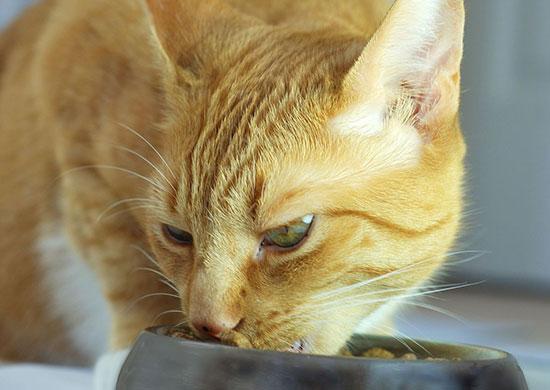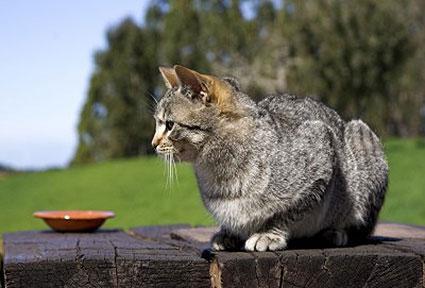This content is archived from the Feline Nutrition Foundation
Arginine: Essential and Abundant for Cat Nutrition
- Updated: Wednesday, April 10, 2019 12:09 PM
- Published: Saturday, June 25, 2011 02:50 PM
- Written by Elisa Katz, DVM
 I read that the amino acid arginine is as important to cats as taurine, but I have never heard of it. Is it true that a cat can get really sick from eating just one meal that has no arginine in it? If I feed raw cat food, is this an amino acid I should worry about or supplement?
I read that the amino acid arginine is as important to cats as taurine, but I have never heard of it. Is it true that a cat can get really sick from eating just one meal that has no arginine in it? If I feed raw cat food, is this an amino acid I should worry about or supplement?
Amino acids are the building blocks that make up proteins. There are 20 different amino acids that commonly make up proteins, 11 of which are essential for cats.¹ An amino acid is considered essential if the animal either cannot make it, or make enough of it on its own, and therefore must obtain it directly from food sources. Arginine is considered an essential amino acid for most mammals, including the cat, an obligate carnivore.²
It is indeed true that eating just one raw cat food meal deficient in arginine can make kitty very sick. Research has shown that cats fed a diet specifically formulated to be deficient in arginine exhibit signs of ammonia toxicity which include drooling, vomiting, lethargy and even convulsions within hours of consuming the diet.³ As a meal is digested, protein is broken down, producing by-products such as ammonia. Cats require it to make enzymes that the liver uses to remove these by-products from the body.⁴ When ammonia is not cleared, it builds up quickly and results in these signs of toxicity.
 Your cat's need for arginine shouldn't worry you, though. According to the National Research Council, the recommended minimum daily allowance is 190 mg per kilogram of body weight.⁵ Being that most cats weigh approximately 10 pounds or 4.5 kilograms at ideal body condition, this would mean that the general requirement would be about 855 mg of arginine per day.
Your cat's need for arginine shouldn't worry you, though. According to the National Research Council, the recommended minimum daily allowance is 190 mg per kilogram of body weight.⁵ Being that most cats weigh approximately 10 pounds or 4.5 kilograms at ideal body condition, this would mean that the general requirement would be about 855 mg of arginine per day.
Getting enough arginine in the diet is not a problem as pretty much every protein source from beef to chicken to rabbit has plenty of it. An ounce of raw chicken has about 360 mg of arginine, an ounce of raw beef about 410 mg and an ounce of raw rabbit about 350 mg.⁶ An average cat will eat somewhere between four and six ounces of raw food a day, so your cat will get enough arginine.
Additional Reading
Note: Feline Nutrition provides feline health and nutrition information as a public service. Diagnosis and treatment of specific conditions should always be in consultation with your own veterinarian. Feline Nutrition disclaims all warranties and liability related to the veterinary advice and information provided on this site.
Dr. Elisa Katz, DVM, is a graduate of Ohio State University and is the owner of Natural Pet Animal Hospital in Bourbonnais, Illinois. She practices holistic and integrative medicine focusing on proper diet and nutrition. Dr. Katz shares her home with four kitties and one dog.
1. Kathy L Gross, et al, "Nutrients," Small Animal Clinical Nutrition, 4th ed. Walsworth Publishing Company, 2000, 48-51.
2. National Research Council Ad Hoc Committee, "Nutrient Requirements of Dogs and Cats," National Academies Press, Washington DC, 2006, 112.
3. James G Morris, "Nutritional and Metabolic Responses to Arginine Deficiency in Carnivores," Journal of Nutrition 115, 1985, 524-531.
4. RO Ball, et al, "Nutritional Consequences of Interspecies Differences in Arginine and Lysine Metabolism," Journal of Nutrition 137, 2007, 1626S-1641S.
5. National Research Council Ad Hoc Committee, "Nutrient Requirements of Dogs and Cats," National Academies Press, Washington DC, 2006, 366.
6. "Foods Highest in Arginine," NutritionData.com, 2011.




